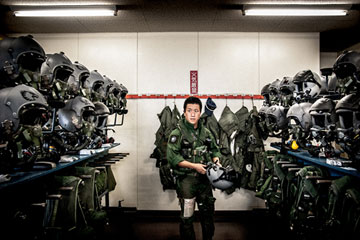
These days, Japanese pilot Kohta "Vader" Araki, who flies F-15s, is always on alert.
(4 of 7)
Despite the SDF's constitutional limitations on any offensive use of force, Japan already boasts the world's fifth highest defense spending. This summer, the Defense Ministry unveiled the Izumo, Japan's biggest warship of the postwar era, which resembles an aircraft carrier; plans are afoot to form a new amphibious corps of soldiers and a fleet of surveillance drones. Abe is also pushing for the formation of a Japanese national-security council. On Sept. 17, he made a plea for the rhetorically tortured concept of "active pacifism," or collective self-defense, in which Japan can come to the aid of its military allies should they come under attack. The liberal newspaper Asahi Shimbun editorialized, "[Collective self-defense] would represent a radical departure from the basic security policy principle of postwar Japan and a gross deviation from its pacifist creed."
The LDP has pitched Abe's security fixation as self-preservation. "We would be happy if everyone in the world is good, and therefore we have no military force," says party secretary general Ishiba. "However, our world doesn't work that way." Certainly, Japan lives in a nervous neighborhood that includes a nuclear North Korea and a China that is rapidly expanding its own military while fueling anti-Japanese fervor. In January, a Chinese frigate locked weapons-targeting radar on a Japanese destroyer in the Senkaku-Diaoyu area, often a precursor to a strike. (The Chinese vessel eventually stood down.) "The Northeast Asia security environment has dramatically changed," says Satoshi Morimoto, a former Japanese Defense Minister. "I don't think Abe is a rightist. He is a reasonable political leader trying to protect our territory."
Tokyo blames China for ratcheting up tensions over the disputed isles--which are located in waters rich in oil and natural gas. "Japan has never changed our attitude toward issues of our territorial waters and land," Defense Minister Itsunori Onodera tells TIME. "It is China today that is trying to change this." But the latest spike in tensions came after the Japanese government nationalized three of the contested islands a year ago. The purchase was aimed, says the government, at preventing the islands from falling into the hands of Tokyo's nationalist governor, who was threatening to buy the outcroppings from their private Japanese owners. (The tiny islands are also claimed by Taiwan.) Beijing took exception to the nationalization, and forays by Chinese planes and vessels have increased markedly since then. Abe's administration is now considering stationing personnel on the isles, which have been uninhabited since before World War II: this would further anger the Chinese. "We can't avert our eyes from the reality: a flurry of provocations against our country's sovereignty," Abe said in mid-September, referring to Japan's territorial spat with China. "I'm pushing for the regeneration of our country's security by looking squarely at reality."
Man With a Past
